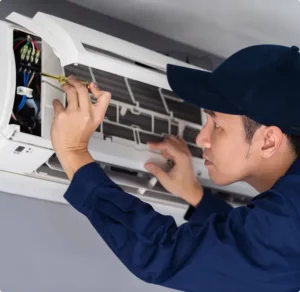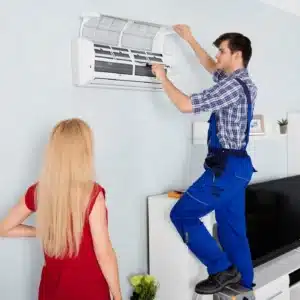Signs Your AC Needs Repair
In Florida’s sweltering heat, a reliable air conditioning system is...
Humidity refers to the quantity of water vapor in the air. Ideal indoor humidity levels should range from 30 to 50 percent since levels outside this range can have negative effects on indoor air quality (IAQ). Usually, the two biggest issues with IAQ are temperature and air quality. Controlling humidity is a crucial component of IAQ, however, that shouldn’t be ignored.
Humidity can affect IAQ in several ways. This can impact not only the health and well-being of occupants but also increase your energy bills and damage your building. Humidity levels that are too high or low can lead to:
Health Concerns: Mold, mildew, and other allergens may develop easily in environments with high humidity levels. Asthma, allergies, and respiratory problems are just a few of the health difficulties that can result from this. Low humidity might also lead to other respiratory problems including dry skin and throat discomfort. These health issues can be avoided with proper humidity control.
Discomfort: The overall comfort of your house or building may be increased with proper humidity control. Due to the sticky, clammy sensation in the air, high humidity levels might make you feel uneasy. Low humidity may be uncomfortable since it dries out the skin and irritates the eyes, throat, and skin. Maintaining correct humidity levels may ensure a comfortable and pleasing interior atmosphere.
Poor Energy Efficiency: Controlling humidity can also help with energy efficiency. If the humidity is too high, air conditioners may need to work harder to cool the air, which increases energy use and utility costs. Maintaining the right humidity levels allows air conditioning systems to run more effectively, consuming less energy and costing less money.
Damage to Building Materials: Building materials like wood, drywall, and insulation can also become damaged by high humidity levels. These materials may warp, swell, or rot if there is too much moisture present. Keeping the right humidity levels helps safeguard building components and reduce the need for expensive repairs.
Increased Lifespan of HVAC System: Maintaining proper humidity levels can help lengthen the life of your HVAC system. The system may have to work harder due to high humidity, which might result in more wear and tear and eventual system failure. Your HVAC system’s lifespan may be increased, and these problems prevented by maintaining optimum humidity levels.
You can regulate the humidity in your house or building in a number of different ways. Dehumidifiers are a useful tool that may be used to remove extra moisture from the air. In addition to their role in temperature regulation, air conditioners also play a significant part in humidity regulation because of their ability to dehumidify the air while simultaneously cooling it. Allowing moisture to escape through effective ventilation also assists in controlling humidity levels.
Proper humidity control is crucial for a healthy and comfortable interior environment because it prevents health risks, improves comfort, increases energy efficiency, protects building materials, and extends the life of HVAC systems. If you are concerned about your indoor air quality or humidity levels, speak to a professional IAQ specialist such as Kyzar Air Conditioning
As a professional HVAC service provider, we have a range of solutions to help improve your indoor air quality, including air conditioning solutions to regulate indoor temperature and ventilation.
We are a state-licensed HVAC service provider based in Florida, offering fast, reliable, and affordable solutions tailored to your needs.
Call 561-640-1000 for a free quote.
Disclaimer: All content on this website is intended for informational purposes only. We discourage anyone from attempting to repair, replace, or maintain HVAC systems without the help of a licensed, insured HVAC technician.

In Florida’s sweltering heat, a reliable air conditioning system is...

In Florida’s hot and humid climate, HVAC systems are essential...

Florida’s warm climate brings many advantages, but it also means...

When it comes to keeping your home comfortable in Florida’s...

In Florida’s hot and humid climate, a reliable air conditioning...

If your air conditioner has been chugging along since the...